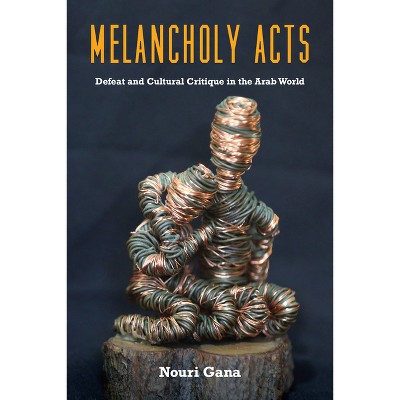Sponsored

Master Plans and Minor Acts - by Shakirah E Hudani (Paperback)
$32.50
In Stock
Eligible for registries and wish lists
Sponsored
About this item
Highlights
- An examination of planning, place, and the politics of repair in post-genocide Rwanda.
- About the Author: Shakirah E. Hudani is assistant professor at the University of North Carolina, Chapel Hill.
- 224 Pages
- Social Science, Human Geography
Description
About the Book
"How might a devastated and divided country, undergoing accelerated urbanization and growth, find its way to an equitable future? What is the role of the city as a terrain for reconciliation and redistribution, and who determines the contours of such processes? These questions are at the heart of Shakirah Hudani's Master Plans and Minor Acts, a detailed examination of the regeneration of post-genocide Rwanda and its capital city of Kigali. While studies of reconciliation in Rwanda have for the most part focused on the national level, Hudani argues that much of the actual work of repair has been in rebuilding Kigali and urban centers around the country. Hudani therefore shifts our perspective to the level of the city: where, through years of fieldwork, she has observed on-the-ground negotiations over material redistribution, dispossession, and rebuilding in the wake of the country's civil war and 1994 genocide. This work of reconciliation at the city and neighborhood level, she shows, has been significantly impacted by efforts to reconstruct the city through largescale master planning, often involving international finance and expertise. Through an examination of this national-urban dynamic, Hudani shows that reconciliation in Rwanda has been, and continues to be, primarily a socio-material and spatial process, consisting of negotiation over property, homes, and the right to urban space"--Book Synopsis
An examination of planning, place, and the politics of repair in post-genocide Rwanda. Master Plans and Minor Acts examines a "material politics of repair" in post-genocide Rwanda, where in a country saturated with deep historical memory, spatial master planning aims to drastically redesign urban spaces. How is the post-conflict city reconstituted through the work of such planning, and with what effects for material repair and social conciliation? Through extended ethnographic and qualitative research in Rwanda in the decades after the genocide of 1994, this book questions how repair after conflict is realized amidst large-scale urban transformation. Bridging African studies, urban studies, and human geography in its scope, this work ties Rwanda's transformation to contexts of urban change in other post-conflict spaces, bringing to the fore critical questions about the ethics of planning in such complex geographies.Review Quotes
"Master Plans and Minor Acts by Shakirah E. Hudani is a thoughtful and nuanced exploration of social and technical planning processes and mechanisms that have shaped and continue to inform the spatiality of post-genocide Rwanda. Hudani deftly weaves together seemingly disparate elements of quotidian life and state urban planning processes in and around Kigali to articulate a holistic understanding of the nature of repair and conciliation that is taking place."-- "International Journal of Urban and Regional Research"
"Hudani demonstrates the importance of theorizing repair, enabling us to spatialize a Levinasian ethics of the neighbor, in the aftermath of traumatic events ranging from mass killings to large-scale dispossession."-- "Society & Space"
"Contemporary Kigali and Rwanda are often presented as gleaming models for a fantastic new urban Africa. This book provides a rigorous, well-researched and cautious set of caveats to the mythmaking, leaving the reader with a nuanced understanding of urban development in post-genocide Rwanda, the oft-claimed 'Singapore of Africa.' The 'minor acts' of the book are the small scale, alternative means of building urban community that run counter to the state's fancy master plans and their near-constant dispossession--and this is where Rwanda's real peacebuilding and reparative justice can take place."--Garth A. Myers, Trinity College
"In this outstanding new book, Shakira Hudani shows how the Rwandan state imposed a vision of post-conflict nationhood through urban planning - materially erasing and replacing memory with an engineered vision of neat social ordering. In the interstices of such violent forms of urban dispossession, Hudani finds "minor acts" of interpersonal conciliation and cooperation that offer limited, but necessary forms of repair amid the irreparable loss of the genocide. Beautifully written, and carefully argued Master Plans and Minor Acts is a major contribution to urban studies, African Studies, and post-conflict studies."--Julie Livingston, New York University
"Over the last two decades enormous changes have been underway in the urban space of Rwanda's capital Kigali, a reordering the post-genocide city as part of an ambitious state-led planning program to rebuild its social and material infrastructures. Master Plans and Minor Acts offers a brilliantly illuminating way to examine post-conflict repair and reckoning through the materiality of the city. Large-scale planning, Hudani argues, is a form of erasure that performs different forms of extraordinary violence through the built environment, at the costs of memory and organic remembrance, rather than the 'minor acts' that offer the prospects of repair and reconciliation. Master Plans and Minor Acts offers a compelling account of the relations between the material character of the city, state power, and the tasks of inhabiting the present."--Michael Watts, University of California, Berkeley
"Shakirah E. Hudani's Master Plans and Minor Acts offers an impressive analysis of urban transformations in post-genocide Kigali and its surrounds. Looking beyond and below statist and transnationally financed capitalist infrastructural projects, Hudani proposes a "material politics of repair" for uncovering place-based and people-based reimagining of the palimpsestic city to reckon with the past, rebuild in the present, and reconstitute an ethical future. The "minor acts" of Hudani's book contain the seed of sustainable urban dwelling in the aftermath of violence." --Cajetan Iheka, Yale University
About the Author
Shakirah E. Hudani is assistant professor at the University of North Carolina, Chapel Hill.Dimensions (Overall): 9.0 Inches (H) x 6.0 Inches (W) x .54 Inches (D)
Weight: .77 Pounds
Suggested Age: 22 Years and Up
Number of Pages: 224
Genre: Social Science
Sub-Genre: Human Geography
Publisher: University of Chicago Press
Format: Paperback
Author: Shakirah E Hudani
Language: English
Street Date: April 17, 2024
TCIN: 1006100566
UPC: 9780226832722
Item Number (DPCI): 247-50-0439
Origin: Made in the USA or Imported
If the item details aren’t accurate or complete, we want to know about it.
Shipping details
Estimated ship dimensions: 0.54 inches length x 6 inches width x 9 inches height
Estimated ship weight: 0.77 pounds
We regret that this item cannot be shipped to PO Boxes.
This item cannot be shipped to the following locations: American Samoa (see also separate entry under AS), Guam (see also separate entry under GU), Northern Mariana Islands, Puerto Rico (see also separate entry under PR), United States Minor Outlying Islands, Virgin Islands, U.S., APO/FPO
Return details
This item can be returned to any Target store or Target.com.
This item must be returned within 90 days of the date it was purchased in store, shipped, delivered by a Shipt shopper, or made ready for pickup.
See the return policy for complete information.
Frequently bought together

$14.45
MSRP $27.00
Buy 1, get 1 50% off select books
5 out of 5 stars with 6 ratings
Guests also viewed

$21.00
MSRP $32.00
Buy 1, get 1 50% off select books
5 out of 5 stars with 4 ratings

$15.68
Buy 1, get 1 50% off select books
4.8 out of 5 stars with 205 ratings










